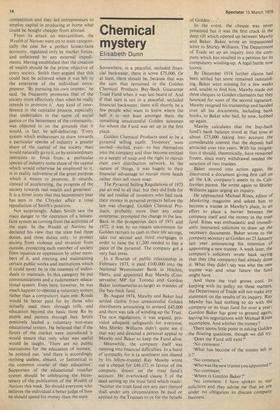Chemical mystery
Elisabeth Dunn
Somewhere, in a peaceful, secluded financial backwater, there is some £75,000. Or at least, there should be, because that was the sum that remained in the Golden Chemical Products Buy-Back Guarantee Trust Fund when it was last heard of. And if that sum is not in a peaceful, secluded financial backwater, there will shortly be a few people who want to know where the hell it is—not least amongst them the remaining unsuccessful Golden salesmen for whom the Fund was set up in the first place.
Golden Chemical Products used to be a pyramid selling outfit. 'Investors' were invited—incited, even—to buy themselves into the company and thus become entitled to a supply of soap and the right to recruit their own distribution network. In the nature of things, it was hugely to their financial advantage to recruit more heads rather than sell more soap.
The Pyramid Selling Regulations of 1973 put an end to all that, but they did little for the sad residue of investors who had sunk their money in pyramid projects before the law was changed. Golden Chemical Products, probably more than any other enterprise, prompted the change in the law. Back in the prosperous days of 1971 and 1972, it was by no means uncommon for Golden recruits to cash in their life savings, take out second and third mortgages in order to raise the £1,200 needed to buy a piece of the pyramid. The company got a very bad press.
In a flourish of public relationship in February 1973, it paid £100,000 into the National Westminster Bank in Hitchin, Herts, and appointed Ray Mawby (Conservative MP for Totnes) and Gordon Baker (consumerist-at-large) as trustees of the buy-back fund.
By August 1974, Mawby and Baker had settled claims from unsuccessful Golden distributors amounting to around £45,000 and there was talk of winding up the Trust. The new regulations, it was argued, provided adequate safeguards for everyone. Mrs Shirley Williams didn't quite see it that way and directed a personal appeal to Mawby and Baker to keep the Fund alive.
Meanwhile, the company itself was running into financial difficulties. In a burst of sympathy for it (a sentiment not shared by his fellow-trustee) Ray Mawby wrote Out a cheque for £46,172 in favour of the company, drawn on the trust fund's account. He overlooked clause 5 of the deed setting up the trust fund which reads: 'Neither the trust fund nor any part thereof shall under any circumstances be paid or applied by the Trustees to or for the benefit of Golden...'
In the event, the cheque was never presented but it was the first crack in the deep rift which opened up between Mawby and Baker. Baker wrote an impassioned letter to Shirley Williams. The Department of Trade set up an inquiry into the company which has resulted in a petition for its compulsory winding-up. A legal battle now looms.
By December 1974 further claims had been settled but some remained outstanding. Baker went missing for a few weeks and, unable to find him, Mawby made out three cheques to Golden claimants but they bounced for want of the second signature. Mawby resigned his trusteeship and handed over all his documents, including bank books, to Baker who had, by now, bobbed up again.
Mawby calculates that the buy-back fund's bank balance stood at that time at about £75,000 taking into account the considerable interest that the deposit had attracted over two years. With his resignation it should, theoretically, have remained frozen, since every withdrawal needed the sanction of two trustees.
Baker moved into action again. He discovered a document giving first call on all the UK company's assets to its Californian parent. He wrote again to Shirley Williams again urging an inquiry.
He approached Michael Rines, editor of Marketing magazine and asked him to become a trustee in Mawby's place, in an effort to place a barrier between the company itself and the money in the trust fund. Rines was enthusiastic and immediately instructed solicitors to draw up the necessary documents. Baker wrote to the company secretary at Golden on 23 January last year announcing his intention of appointing a new trustee. A week later, the company's solicitors wrote back saying that they (the company) had already done it. What they didn't say was who the new trustee was and what future the fund might have.
And there the trail grows cool. In keeping with its policy on these matters, the Department of Trade will not make any statement on the results of its inquiry. Ray Mawby has had nothing to do with the company or its trust fund for over a year; Gordon Baker has gone to ground again, leaving his negotiations with Michael Rifles incomplete. And whither the money?
There seems little point in asking Golden the floating questions, though we did try. `Does the Fund still exist ?'
No comment.'
'What has become of the money left in it ?'
'No comment.'
'Who was the new trustee you appointed ?' 'No comment.'
'Where is Gordon Baker?'
'No comment. I have spoken to our solicitors and they advise me that we are under no obligation to discuss company business.'


































 Previous page
Previous page